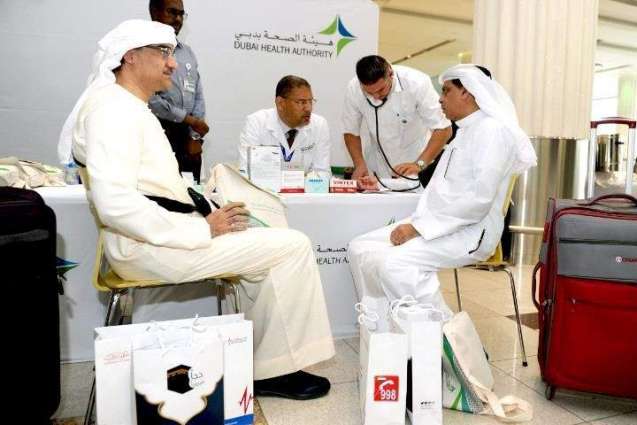As Muslims across Dubai leave for the annual Islamic Hajj pilgrimage to Mecca, the Dubai Health Authority, DHA, is conducting medical check-ups and sharing health tips with pilgrims departing from Terminal 3 at the Dubai International Airport.
DUBAI, (Pakistan Point News - 13th Aug, 2018) As Muslims across Dubai leave for the annual Islamic Hajj pilgrimage to Mecca, the Dubai Health Authority, DHA, is conducting medical check-ups and sharing health tips with pilgrims departing from Terminal 3 at the Dubai International Airport.
The DHA is one of six government and private entities taking part in the Hajj 2018 Campaign, which was launched today and will run until 15th August at the departures area of the terminal.
The annual campaign aims to raise awareness amongst pilgrims on health measures that ensure a safe pilgrimage.
As a part of the campaign, the DHA's doctors and nurses are conducting medical check-ups, while the authority’s health educators are sharing health tips on how to prevent medical issues from arising during rituals and how to use first-aid kits. The DHA also gave out gift bags containing first-aid kits, caps, educational booklets etc.
Other entities taking part in the campaign, which is targeting 2,000 pilgrims, include Dubai Corporation for Ambulance Services, the Ministry of Health, the Airport Police Service, Al Garhoud Private Hospital, The General Directorate of Residency and Foreigners Affairs Dubai and the Dubai Civil Aviation Authority.
Dr Manal Taryam, CEO of the Primary Healthcare Sector at the DHA, commended the campaign adding that raising awareness on health preventive measures can drastically reduce the number of health issues amongst pilgrims.
Dr Taryam called on pilgrims to get vaccinated at DHA’s primary healthcare centres to prevent the spread of diseases while performing Hajj.
"Pilgrims should get vaccinated at least 10 to 15 days in advance. We advise that they take seasonal flu and meningococcal vaccines to keep themselves safe and healthy during the Hajj. These vaccinations are available at all DHA primary healthcare centres," Dr Taryam said.
Precautionary health tips that DHA doctors advise pilgrims to follow include: Tips for the elderly and people with chronic diseases - The elderly and people with chronic diseases should first go to their doctor who will evaluate their health before giving them the approval to go.
- Those with chronic diseases must take all their prescribed medication for the full duration of the Hajj and take extra medication with them in case.
- They should also wear a bracelet or keep a card on them at all times with their name, contact number, health condition and medication in case of an emergency.
- Diabetics should not forget to keep their glucose measuring devices with them at all times along with candy in case their sugar level drops.
Tips for all pilgrims - They should take a first-aid bag with them that has precautionary medication including medicines for fever, cold, cough, diarrhoea, painkillers and skin and muscle spasm creams. They should also carry with them cotton, gauze and a steriliser.
- They should start exercising a month before for an hour a day to prepare themselves for the rituals that require a lot of walking.
- They should make sure they wear comfortable closed shoes that are a size bigger because feet tend to get swollen in the heat after walking for hours.
- They should wear light cotton fabrics and avoid contact lenses as the heat and dust can cause eye dryness and irritation.
- They should take care of their hygiene and wash their hands.
- They should cover their mouth with a cloth when they sneeze.
- They should wear facemasks and change them every four hours.
- They should make sure to shave in specialised and licenced barbershops to avoid infections.
Nutritional tips for pilgrims - They should drink three to four litres of water a day to stay hydrated and eat a lot of fruits and vegetables.
- They should avoid exposed food and rely on canned or packaged foods.
-They should also check the expiry date of food before consuming it and make sure it is stored in the right temperature.




